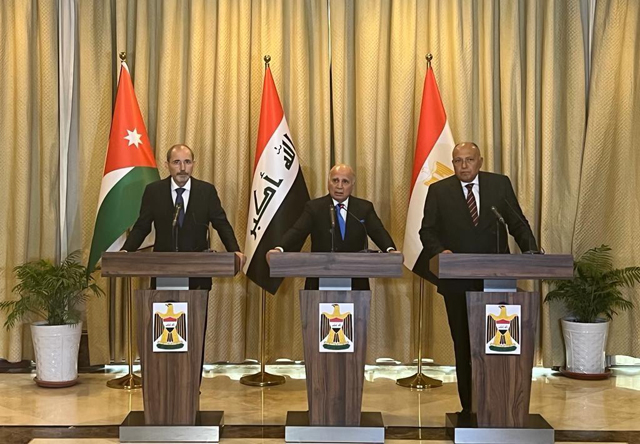AMMAN — Deputy Prime Minister and Foreign Minister Ayman Safadi on Monday participated in the Jordanian-Egyptian-Iraqi tripartite meeting in Baghdad.
During his visit alongside Egyptian Foreign Minister Sameh Shoukry to Iraq, Safadi conveyed the greetings of His Majesty King Abdullah to the Iraqi people and a number of Iraqi leaders including Prime Minister Mustafa Al Kadhimi, Parliament Speaker Mohammed Al Halbousi, and Foreign Minister Fuad Hussein, according to a Foreign Ministry statement.
The Jordanian FM also delivered a message from the King, reiterating Jordan’s unwavering support towards Iraq.
Safadi reaffirmed the Kingdom's commitment to strengthening Jordanian-Egyptian-Iraqi cooperation within the framework of the tripartite cooperation in accordance with the directives of His Majesty.
In a joint press statement with his Egyptian and Iraqi counterparts, Safadi revealed that the visit to Iraq came as a follow up on the tripartite cooperation launched by the three countries’ leaderships to enhance joint work “in service of our people”.
He described consolidating tripartite cooperation as a “systematic, institutional step, which is needed to face numerous, growing challenges in the region, as a result of both regional issues and the Ukrainian crisis and its repercussions on food security, energy and commodity prices.
Safadi stressed that the three countries continue to enhance their cooperation, as "the visions are clear, the will is solid, and the work is systematic and continuous".
In regard to the Iraqi situation, Safadi said that Jordan stands by Iraq in facing all challenges, stressing that the security, stability and achievements of Iraq interrelate with Jordan’s.
Safadi pointed out that during the meetings held under the umbrella of tripartite cooperation, the three parties were able to identify and institutionalise areas of cooperation, including trade, industry, economy, land transport, electrical connection, among others.
Discussions also dealt with regional developments, foremost of which is the Palestinian cause, and the continuous efforts to support Palestinians in their pursuit of their full legitimate rights, most notably their right to freedom and an independent, sovereign state, with Jerusalem as its capital, he said.
He said that the meeting will be followed by a series of other sectoral and technical meetings.
“There is a clear roadmap to achieve more cooperation in implementation of the visions of our leaders” through serious, systematic and productive work in service of the interests of the three countries and as a contribution to strengthening joint Arab action, he added.
In response to a question, Safadi highlighted the agreements signed to bolster cooperation, pointing to the electric power grids linkage agreement between Jordan and Iraq, in which Jordan, whose electrical network is connected to Egypt’s, is expected to export electricity to Iraq at the beginning of 2023 following the completion of necessary infrastructure.
In regard to the oil pipeline project from Basra to Aqaba, Safadi referred to the project’s benefits to Jordan, Iraq and Egypt, as the project’s vision includes linking Jordan to Egypt as well.
Safadi highlighted that the project requires conducting thorough studies and achieving consensus, adding that 80 per of the preparations required to launch this project have been completed, as the three countries are now in the final stages of their agreement.
Both the principle and feasibility of the project as evident in preliminary were agreed upon, specifically in regard to issues such as transportation and electricity.
Safadi also pointed to the industrial city/free zone project expected to be located on the Jordanian-Iraqi borders, where the three countries will launch this city as an investment site, to achieve economic integration among parties.
The industrial city project is in its final preparatory stages prior to the beginning of attracting industries and investments, he added.
“No project will succeed unless it achieves a common benefit for all its parties. We are confident that this tripartite cooperation is able to bring good to our countries and people, providing a platform for more regional cooperation that has proven to be invaluable, especially in dealing with the spread of the coronavirus pandemic and the consequences of the Russian-Ukrainian conflict,” the foreign minister said.
Safadi said that cooperation is integrated, which merges economy and politics in the face of challenges, highlighting cooperation in combating terrorism, which constitutes a common enemy to all.
In turn, Hussein noted that the Jordanian and Egyptian foreign ministers’ visit comes under the framework of tripartite cooperation, coordination and continuous deliberation on issues related to the three countries as well as regional and international developments.
After facing the spread of the pandemic, which constituted a global challenge, the world now faces a challenge no less dangerous than the coronavirus, which is the challenge of war, he stressed.
The Russian-Ukrainian war is geographically linked to Europe, but the dimensions of this war affect a number of countries and societies, including those in the region, Hussein said, highlighting the war’s effect on the energy crisis, reflected in the spike in energy prices.
For his part, Shoukry affirmed that this is an opportunity to materialise the directives of the leaders of the three countries and the strong political relations that bind them to bolster the Egyptian-Iraqi-Jordanian cooperation in service of the interests of their people on the basis of common history, civilisation and deep-rooted relations that link the three countries on an institutional level as well.
Since the establishment of the tripartite framework, the goal has been to support Iraq and its stability, preserve its sovereignty after years of challenges and restore its regional and international status.
In regard to regional issues, Shoukry referred to joint efforts exerted to form a unified vision to overcome these challenges, including bolstering cooperation mechanisms, following up on achievements within the framework of tripartite cooperation in various sectors, ensuring coordination and exploring new areas of cooperation.
Shoukry expressed keenness for working jointly, coordinating and solidifying Arab national security, not only through the framework of the tripartite cooperation, but also through the Arab League to live up to the aspirations of all Arabs.
